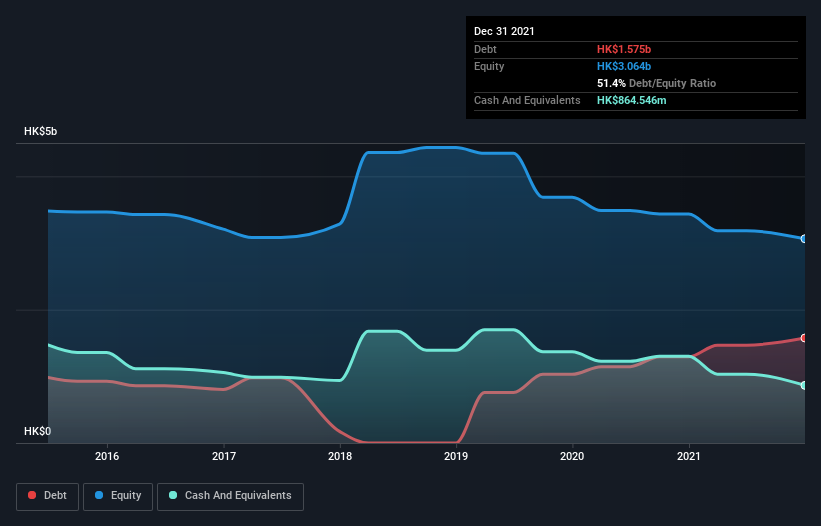- Hong Kong
- /
- Entertainment
- /
- SEHK:326
We Think China Star Entertainment (HKG:326) Is Taking Some Risk With Its Debt

The external fund manager backed by Berkshire Hathaway's Charlie Munger, Li Lu, makes no bones about it when he says 'The biggest investment risk is not the volatility of prices, but whether you will suffer a permanent loss of capital.' It's only natural to consider a company's balance sheet when you examine how risky it is, since debt is often involved when a business collapses. As with many other companies China Star Entertainment Limited (HKG:326) makes use of debt. But the real question is whether this debt is making the company risky.
What Risk Does Debt Bring?
Debt and other liabilities become risky for a business when it cannot easily fulfill those obligations, either with free cash flow or by raising capital at an attractive price. If things get really bad, the lenders can take control of the business. However, a more frequent (but still costly) occurrence is where a company must issue shares at bargain-basement prices, permanently diluting shareholders, just to shore up its balance sheet. Of course, the upside of debt is that it often represents cheap capital, especially when it replaces dilution in a company with the ability to reinvest at high rates of return. The first thing to do when considering how much debt a business uses is to look at its cash and debt together.
See our latest analysis for China Star Entertainment
How Much Debt Does China Star Entertainment Carry?
As you can see below, at the end of December 2021, China Star Entertainment had HK$1.58b of debt, up from HK$1.29b a year ago. Click the image for more detail. However, it does have HK$864.5m in cash offsetting this, leading to net debt of about HK$710.7m.

How Strong Is China Star Entertainment's Balance Sheet?
According to the balance sheet data, China Star Entertainment had liabilities of HK$2.22b due within 12 months, but no longer term liabilities. Offsetting this, it had HK$864.5m in cash and HK$483.6m in receivables that were due within 12 months. So its liabilities total HK$873.7m more than the combination of its cash and short-term receivables.
This deficit isn't so bad because China Star Entertainment is worth HK$2.24b, and thus could probably raise enough capital to shore up its balance sheet, if the need arose. But it's clear that we should definitely closely examine whether it can manage its debt without dilution.
We measure a company's debt load relative to its earnings power by looking at its net debt divided by its earnings before interest, tax, depreciation, and amortization (EBITDA) and by calculating how easily its earnings before interest and tax (EBIT) cover its interest expense (interest cover). The advantage of this approach is that we take into account both the absolute quantum of debt (with net debt to EBITDA) and the actual interest expenses associated with that debt (with its interest cover ratio).
With a net debt to EBITDA ratio of 60.0, it's fair to say China Star Entertainment does have a significant amount of debt. However, its interest coverage of 3.4 is reasonably strong, which is a good sign. However, the silver lining was that China Star Entertainment achieved a positive EBIT of HK$6.3m in the last twelve months, an improvement on the prior year's loss. There's no doubt that we learn most about debt from the balance sheet. But you can't view debt in total isolation; since China Star Entertainment will need earnings to service that debt. So when considering debt, it's definitely worth looking at the earnings trend. Click here for an interactive snapshot.
But our final consideration is also important, because a company cannot pay debt with paper profits; it needs cold hard cash. So it's worth checking how much of the earnings before interest and tax (EBIT) is backed by free cash flow. Over the last year, China Star Entertainment recorded negative free cash flow, in total. Debt is usually more expensive, and almost always more risky in the hands of a company with negative free cash flow. Shareholders ought to hope for an improvement.
Our View
Mulling over China Star Entertainment's attempt at managing its debt, based on its EBITDA,, we're certainly not enthusiastic. Having said that, its ability to grow its EBIT isn't such a worry. Overall, we think it's fair to say that China Star Entertainment has enough debt that there are some real risks around the balance sheet. If all goes well, that should boost returns, but on the flip side, the risk of permanent capital loss is elevated by the debt. When analysing debt levels, the balance sheet is the obvious place to start. But ultimately, every company can contain risks that exist outside of the balance sheet. We've identified 1 warning sign with China Star Entertainment , and understanding them should be part of your investment process.
When all is said and done, sometimes its easier to focus on companies that don't even need debt. Readers can access a list of growth stocks with zero net debt 100% free, right now.
New: AI Stock Screener & Alerts
Our new AI Stock Screener scans the market every day to uncover opportunities.
• Dividend Powerhouses (3%+ Yield)
• Undervalued Small Caps with Insider Buying
• High growth Tech and AI Companies
Or build your own from over 50 metrics.
Have feedback on this article? Concerned about the content? Get in touch with us directly. Alternatively, email editorial-team (at) simplywallst.com.
This article by Simply Wall St is general in nature. We provide commentary based on historical data and analyst forecasts only using an unbiased methodology and our articles are not intended to be financial advice. It does not constitute a recommendation to buy or sell any stock, and does not take account of your objectives, or your financial situation. We aim to bring you long-term focused analysis driven by fundamental data. Note that our analysis may not factor in the latest price-sensitive company announcements or qualitative material. Simply Wall St has no position in any stocks mentioned.
About SEHK:326
China Star Entertainment
An investment holding company, engages in the investment, production, distribution, and licensing of films and television drama series in Hong Kong, Macau, the People’s Republic of China, and internationally.
Adequate balance sheet and slightly overvalued.
Market Insights
Community Narratives




